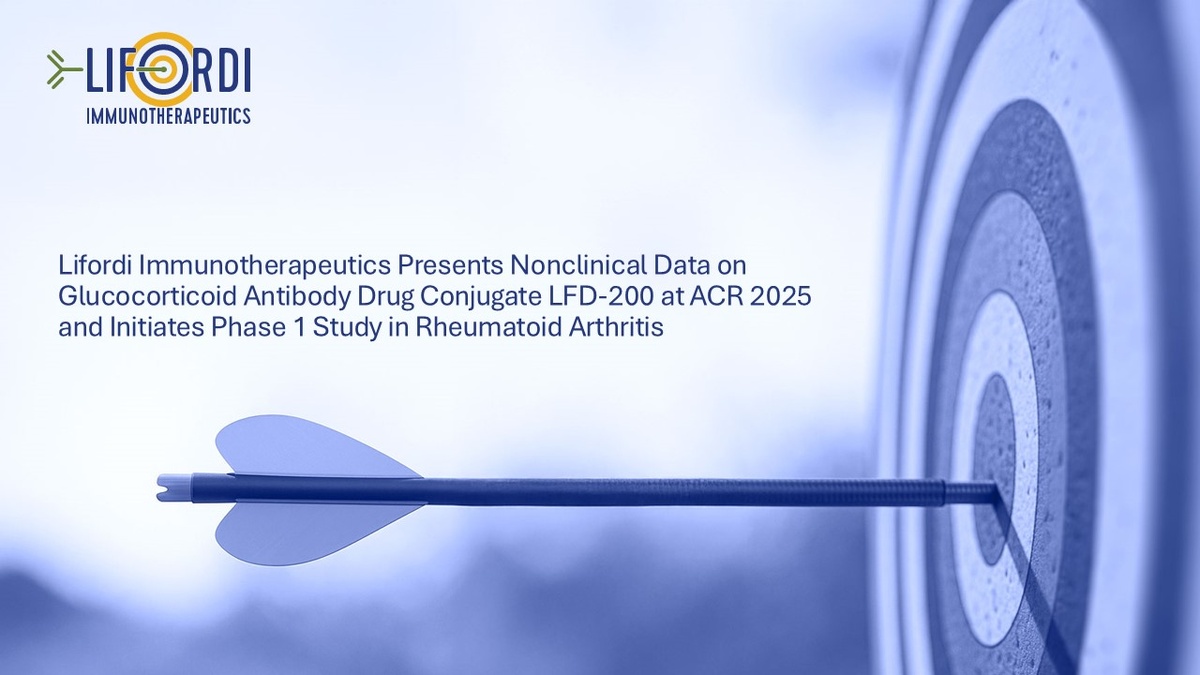
Lifordi Immunotherapeutics Advances Glucocorticoid ADC LFD-200 into Phase 1 Rheumatoid Arthritis Trial Following Promising Nonclinical Data
TL;DR
Lifordi's LFD-200 ADC provides sustained anti-inflammatory effects without systemic toxicity, offering a potential competitive advantage in autoimmune treatment with reduced side effects.
LFD-200 uses VISTA-targeted delivery to achieve sustained glucocorticoid exposure in immune cells for at least seven days while avoiding cortisol suppression and bone toxicity.
This technology could revolutionize autoimmune disease treatment by providing effective therapy without the debilitating side effects that currently limit glucocorticoid use for patients.
Lifordi's antibody-drug conjugate delivers steroids directly to immune cells, achieving sustained anti-inflammatory effects without impacting cortisol levels or bone density in primate studies.
Lifordi Immunotherapeutics has presented compelling nonclinical data for its lead candidate LFD-200 at the American College of Rheumatology Convergence 2025 meeting while simultaneously announcing the initiation of Phase 1 clinical studies in rheumatoid arthritis patients. The company's innovative approach involves an antibody-drug conjugate that selectively delivers a potent glucocorticoid payload directly to immune cells, addressing a longstanding challenge in autoimmune treatment.
The data presented demonstrated that LFD-200 achieves sustained glucocorticoid exposures in immune cells of non-human primates for at least seven days following a single dose. Immunohistochemistry analysis confirmed the presence of the glucocorticoid payload in immune tissues of lymph nodes and spleen seven days after administration, with no staining observed in vehicle controls. The treatment also showed dose-dependent reduction of proinflammatory cytokines after ex vivo stimulation of whole blood and bone marrow, with significant decreases in TNFα and IL-1β levels following single doses at both 5 mg/kg and 20 mg/kg.
Perhaps most notably, the studies revealed that LFD-200 does not suppress cortisol levels at clinically relevant doses. No change in cortisol was observed after single doses up to 20 mg/kg for up to 14 days, unlike dexamethasone controls. Furthermore, after 13 weekly doses of LFD-200 at 25 mg/kg, no cortisol reduction was detected, and critically, no suppression of bone formation markers or reduction in bone mineral density was observed. This represents a significant advancement given that bone density loss and cortisol suppression have historically limited long-term glucocorticoid use in autoimmune conditions.
Dr. Matthew W. McClure, Chief Medical Officer of Lifordi, emphasized the importance of these findings, stating that harnessing glucocorticoid anti-inflammatory effects while limiting systemic toxicities has been the treatment goal for 75 years. The company's VISTA-targeted delivery approach appears to achieve this by providing sustained anti-inflammatory effects without the typical toxicity concerns associated with systemic glucocorticoid administration.
The Phase 1 single ascending dose/multiple ascending dose clinical study in rheumatoid arthritis is now underway, with initial data from healthy participants expected by year-end 2025. Rheumatoid arthritis represents a significant unmet medical need, affecting millions worldwide, where glucocorticoids have demonstrated high efficacy but their use has been constrained by toxicity concerns. Additional information about the company's research can be found at https://www.lifordi.com.
This development could potentially transform treatment paradigms for rheumatoid arthritis and other autoimmune conditions by enabling targeted glucocorticoid therapy without the systemic side effects that have limited their long-term use. The successful translation of these nonclinical findings to human studies would represent a major breakthrough in autoimmune disease management, offering patients more effective and safer treatment options.
Curated from Reportable
